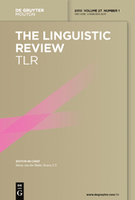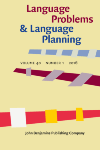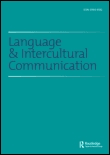
LINGUISTIC REVIEW
Scope & Guideline
Connecting Theories and Applications in Linguistics.
Introduction
Aims and Scopes
- Translanguaging and Multilingualism:
A core area of focus, the journal emphasizes translanguaging practices, showcasing how multilingual individuals navigate and negotiate their linguistic resources in diverse settings, including education and social interactions. - Intercultural Communication:
Research on intercultural communication is prevalent, highlighting how language mediates relationships and understanding across cultures, especially in global contexts and migration scenarios. - Language and Identity:
The journal explores the intricate relationship between language and identity, investigating how linguistic practices shape individual and collective identities, particularly among marginalized and transnational communities. - Ethical and Critical Perspectives:
A distinctive contribution of the journal is its emphasis on ethical considerations in language research, advocating for social justice and decolonization in language education and policy. - Technology and Language:
The impact of technology on language use and learning is a significant theme, with studies examining the role of artificial intelligence and digital communication in shaping contemporary linguistic practices. - Cultural Contexts of Language:
The journal also addresses the cultural dimensions of language, investigating how cultural narratives and practices influence language use in various contexts, including education, media, and community interactions.
Trending and Emerging
- AI and Language:
The intersection of artificial intelligence and language use is a rapidly emerging theme, with research focusing on how AI technologies impact communication, education, and the ethical implications of their use in linguistic contexts. - Decolonization in Language Education:
There is a growing emphasis on decolonization within language education, with scholars advocating for practices that challenge colonial legacies and promote indigenous and marginalized voices in linguistic research. - Emotional and Psychological Dimensions of Language Learning:
Research exploring the emotional aspects of language learning, including anxiety, motivation, and identity, is increasingly prominent, acknowledging the psychological factors that influence language acquisition and use. - Critical Discourse Analysis:
Critical approaches to discourse analysis are emerging, focusing on how language constructs power dynamics and social inequalities, particularly in contexts of migration, race, and identity. - Community and Language Practices:
An increasing number of studies are examining language practices within specific communities, highlighting local contexts and the role of language in shaping community identities and interactions.
Declining or Waning
- Traditional Language Teaching Methods:
There is a noticeable decrease in publications focusing on traditional language teaching methodologies, as the field moves towards more integrated and communicative approaches that emphasize real-world language use. - Monolingual Perspectives:
Research centered around monolingual language acquisition and use is becoming less frequent, with a growing recognition of the complexities and realities of multilingualism in contemporary societies. - Standardized Testing:
The focus on standardized language testing is waning, potentially due to increasing critiques of such assessments and their limitations in capturing linguistic competence in diverse contexts. - Descriptive Linguistics without Societal Context:
There is a trend away from purely descriptive linguistic studies that do not engage with societal implications, reflecting a broader interest in research that connects linguistic phenomena to social justice and ethical considerations. - Static Language Policies:
Research that treats language policies as static and unchanging is declining, as scholars increasingly advocate for dynamic approaches that consider the fluid nature of language in social contexts.
Similar Journals

Language Problems & Language Planning
Unraveling the Threads of Communication and PlanningLanguage Problems & Language Planning is a pivotal scholarly journal published by John Benjamins Publishing Co, renowned for its contributions to the fields of linguistics, communication, and language studies. With an ISSN of 0272-2690 and an E-ISSN of 1569-9889, this journal has been a cornerstone of academic discourse since its inception in 1977 and will continue to serve as a vital resource until 2024. Currently, it holds a respectable position within the Q3 category in both Communication and Linguistics and Language, reflecting its significant impact in these areas. The journal focuses on the intersection of language-related challenges and planning, addressing critical issues that affect societies worldwide, making it essential reading for researchers, policymakers, and students alike. Although it does not offer Open Access options, its articles provide valuable insights supported by a rigorous peer-review process, fostering a diverse dialogue among scholars and practitioners. Recognized in the Scopus rankings, Language Problems & Language Planning offers a platform for original research and theoretical discussions that advance understanding of language issues in a globalized world.

Language and Intercultural Communication
Enriching Perspectives in Language and Intercultural StudiesLanguage and Intercultural Communication is a leading peer-reviewed journal published by Routledge Journals, Taylor & Francis Ltd, based in the United Kingdom. With an ISSN of 1470-8477 and an E-ISSN of 1747-759X, this esteemed publication has established itself as a vital resource in the fields of Communication and Linguistics, boasting an impressive Q1 classification in both categories as of 2023. The journal's scope encompasses a broad range of topics related to language and its role in intercultural contexts, making it an essential platform for researchers, professionals, and students alike who wish to contribute to and learn from the latest scholarly discussions. Even without an open-access option, its high impact factor and strong Scopus rankings, which place it in the 87th percentile for Linguistics and Language, affirm its significance in shaping contemporary dialogue. As we move towards 2024, Language and Intercultural Communication continues to foster academic exchanges that challenge, expand, and enrich understanding across diverse linguistic and cultural landscapes, making it a must-read for anyone interested in the intersection of language and culture.

Archivum
Connecting Researchers with Open Access InsightsArchivum, published by UNIV OVIEDO in Spain, stands as a vital resource in the fields of Linguistics and Language as well as Literature and Literary Theory. With an impact factor reflective of its commitment to scholarly excellence, this journal has proudly maintained an Open Access model since 1951, ensuring that its rich repository of knowledge is freely available to researchers, professionals, and students alike. Covering a converged span from 2019 to 2023, Archivum has strategically positioned itself within the academic milieu, currently categorized in the Q4 for Linguistics and Language and Q3 for Literature and Literary Theory as of 2023. The journal is indexed in Scopus, with rankings that reflect its growing influence, such as #690 in Literature and Literary Theory and #887 in Language and Linguistics. Despite its challenges in visibility, Archivum remains essential for those seeking to engage with contemporary discussions and research within the humanities. Located in the heart of Asturias, it embodies the scholarly spirit of Spain, fostering a collaborative environment for innovation and inquiry in linguistic and literary studies.

NEUPHILOLOGISCHE MITTEILUNGEN
Navigating the Intricacies of Philology and Linguistic StudiesNEUPHILOLOGISCHE MITTEILUNGEN, published by the esteemed Modern Language Society, stands as a significant contribution to the domain of Language and Linguistics. With a history dating back to 1971, this journal has consistently provided an academic platform for researchers and scholars, navigating through the intricacies of philology and linguistic studies. Although it is indexed in Scopus with rankings reflecting its position in the Arts and Humanities and Social Sciences categories, it currently does not offer Open Access, which may require interested parties to seek institutional access for its wealth of content. The journal has experienced periods of coverage discontinuation in recent years, yet it remains a valued source for advancing the understanding of language theories and linguistic practices. Its location in Helsinki, Finland, offers a unique European perspective on global linguistic issues. The journal is ideal for those looking to engage with evolving linguistic trends and contribute to contemporary discussions in the field.

Studii de Lingvistica
Fostering innovation in linguistic studies.Studii de Lingvistica is a premier open-access journal committed to advancing the field of linguistics and language studies since its inception in 2011. Published by EDITURA UNIV ORADEA in Romania, this scholarly platform aims to disseminate high-quality research that encompasses various aspects of linguistics, encouraging contributions from researchers and professionals worldwide. With an impact factor that reflects its relevance, the journal holds a prestigious position in the Q2 category of Linguistics and Language for 2023. Despite its relatively nascent H-index, Studii de Lingvistica has carved a niche for itself, ranking 1017th and 1094th in Scopus across Arts and Humanities and Social Sciences, respectively. Researchers, scholars, and students alike will find valuable insights and pioneering studies within its pages, making it a vital resource for those engaged in the nuanced exploration of language and its cognitive dimensions. Located at UNIVERSITATII ST NO 1, PAVILION C, ORADEA, BIHOR, ROMANIA, this journal continues to foster academic dialogue and innovation within the linguistics community.

Linguistica y Literatura
Illuminating the Rich Tapestry of Language and ExpressionLinguistica y Literatura is a distinguished academic journal published by the Universidad de Antioquia within the Department of Linguistics and Literature. With a strong focus on the interdisciplinary study of language and literature, this journal serves as a critical platform for researchers, educators, and students alike to explore innovative scholarship and emerging trends in the field. Though specific impact metrics such as HIndex and Scopus ranks are not provided, the journal remains an essential resource for those dedicated to advancing linguistic and literary analysis in the Hispanic context. The journal operates under a traditional access model, ensuring broad distribution and visibility among academics. By fostering discussions that illuminate the complexities of language and literary expression, Linguistica y Literatura is poised to contribute significantly to the ongoing dialogue in both disciplines, promoting richer understanding and engagement in the study of human communication and culture.

Suvremena Lingvistika
Advancing Linguistic Research for a Global Audience.Suvremena Lingvistika is a distinguished open-access journal published by the Croatian Philological Society, dedicated to advancing research in the field of linguistics and language. Since its establishment, the journal has been pivotal in promoting scholarly dialogue within the linguistics community, especially among researchers and academics in Croatia and beyond. With an ISSN of 0586-0296 and an E-ISSN of 1847-117X, the journal has transitioned to an open-access model since 2007, ensuring that research is freely accessible to all. As of 2023, it holds a respectable Q3 ranking in the Linguistics and Language category, reflecting its potential contribution to the field. The journal's scope encompasses a wide array of linguistic disciplines, encouraging both theoretical and empirical studies. Supportive of new research, Suvremena Lingvistika aims to foster innovative approaches and methodologies in linguistics, making it an essential resource for students, researchers, and professionals eager to explore the complexities of language. With its ongoing publication until 2024, it continues to shape the linguistic landscape, providing valuable insights and fostering collaboration among scholars globally.

MODERNA SPRAK
Connecting Researchers and Educators in Language ScienceMODERNA SPRAK, published by LMS-Modern Language Teachers Association, is a vital journal in the field of linguistics and language studies that has been contributing to academic discourse since its inception in 2002. With an ISSN of 2000-3560, this Swedish journal provides a platform for researchers, educators, and language enthusiasts to explore contemporary issues and advancements in linguistics. Despite its Q4 category ranking in the 2023 category quartiles, its focus on diverse linguistic perspectives and innovative methodologies ensures its continued relevance and importance. As of 2023, it holds notable ranks within Scopus, placing it within the lower percentile of its categories—yet this offers a unique opportunity for emerging scholars to contribute to its growth and visibility. While MODERNA SPRAK is not an open access journal, it serves as a rich resource for academic networking and knowledge sharing in the evolving landscape of language education and research. The journal's commitment to fostering scholarship within an inclusive framework makes it an essential read for those engaged in the language sciences across various educational contexts.

Baltic Journal of English Language Literature and Culture
Connecting Cultures through Language and LiteratureBaltic Journal of English Language Literature and Culture is a prominent platform for scholarly discourse in the fields of English language, literature, and cultural studies, published by University of Latvia Press since its inception. With an ISSN of 1691-9971 and an e-ISSN of 2501-0395, the journal has established itself as an Open Access resource since 2018, making it accessible to a global audience of researchers, academicians, and students. Located in Riga, Latvia, this journal endeavors to bridge gaps in the understanding of linguistic and literary developments, particularly in the Baltic region. Although it faces competitive ranking in the Scopus database, underscored by its current rankings of #1055 in Literature and Literary Theory and #1063 in Language and Linguistics, the journal continues to attract contributions that reflect innovative research and inquiry. Through its open-access model, Baltic Journal of English Language Literature and Culture is dedicated to fostering a diverse range of perspectives and nurturing dialogue that enriches the understanding of the English language’s intersection with culture and literature.

Yazyk i Kultura-Language and Culture
Fostering Dialogue Between Linguistics and CultureYazyk i Kultura - Language and Culture is a distinguished academic journal dedicated to the exploration of linguistic and cultural issues across various contexts. Published by TOMSK STATE UNIVERSITY, this journal serves as a vital resource for researchers, scholars, and students interested in the intricate interplay between language and culture. With an ISSN of 1999-6195 and an E-ISSN of 2311-3235, it engages a global community in disseminating high-quality research articles, reviews, and theoretical discussions. Although the journal is not categorized as Open Access, it ensures that its contents contribute significantly to the academic discourse within the fields of linguistics, cultural studies, and social sciences. With a commitment to promoting scholarly research, Yazyk i Kultura is positioned to shape contemporary conversations about language's role in cultural dynamics, making it an essential outlet for those dedicated to advancing understanding in this interdisciplinary domain.